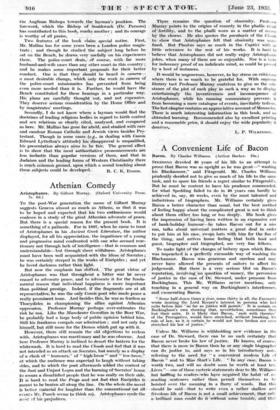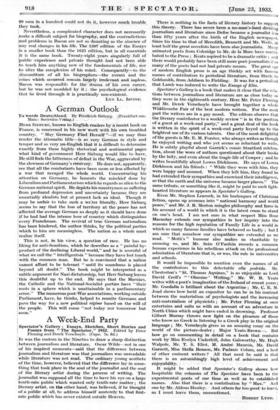A Convenient Life of Bacon Bacon. By Charles Williams. (Arthur
Barker. 10s.) SPEDDING devoted 40 years of his life to an attempt to prove that Bacon was as upright as he was great—" washing his Blackamoor," said Fitzgerald. Mr. Charles Williams prudently decided not to give so much of his life to the same task, and to spare his friends a regret similar to Fitzgerald's. -hut he must be content to have his prudence. commended, for what Spedding failed to . do in 40 years can hardly be achieved in, say, 40 weeks, even by the most talented and industrious of biographers. Mr. Williams certainly gives Bacon a better character than usual, but the best method of feeling happy about the complicated great is not to think about them either too long or too deeply. His • book gives the impression of having been written in an expansive sort of bank-holiday bumour—he takes Bacon out for a' nice run, talks about universal matters a great deal in order ! to ptit him at his ease, swops hats with him for the fun of the thing, and, arrives home feeling that both. host . and guest, biographer and bitigraphed, are very - fine fellows. - To make light of the charges of bribery upon which Bacon was impeached is a perfectly excusable way of washing the • Blackamoor. Bacon was generous and careless and may never have allowed the presents of suitors to affect his judgement. But there is a very serious blot on Bacon's reputation, involving-no question of money, the perversion of justice in the case of Dr. Steward, under" pressure from Buckingham. This Mr. Williams never _ mentions, only touching in a general way on Buckingham's „interference, and exonerating Bacon.
" Some half-dozen times a year, some thirty in all, the Favourite wrote desiring the Lord Keeper's interest in persons who. had suits before him far as justice will permit.' It is certain on Buckingham's own showing that, -nevertheless, sometimes they lost their suits. It is likely that Bacon, ` rash with theories' of the Prerogative, would have- stretched, without breaking, his rule of law, -as it is certain he would not have broken nor even stretched his law of justice."
Unless Mr; Williams is ;withholding new evidence in the ease of Dr. Steward, there can be no such certainty that Bacon never broke his law of justice. He knows, of course, that there is rnoreinfBaeOn than he or any single biographer can do_ justice eto, and says so in his introductory note, referring to the need for " a . convenient modern Life of Bacon " and to Miss. -Start's Life. " In :anirciie; Bacon is worth two, and- will no doubt soon be 'worth at least ten, _Lives "—one of those esoteric statements dear to Mr. Williams but baffling to readers-wlie have -acquired. the- habit of _re- treading sentences rather than permit themselves to be hoisted over the meaning in a flurry of words. But this should be said—that to write even a rather shallow and frivolous life of Bacon is not a small achievement- that only ‘brilliant man could- do it -without some trouble, and that
99 men in a hundred could not do it, however much trouble they took.
Nevertheless, a complicated character does not necessarily ;make a difficult subject for biography, and the contradictions and problems in Bacon are not so daunting as the absence of ;any real changes in his life. The 1597 edition of the Essays tis a smaller book than the 1625 edition, but in all essentials it is the same book. Twenty-eight years singularly _ full of Itpublic experience and private thought had not been able to teach him anything new of the fundamentals of life, nor to alter the complexion of his mind. Consequently=to the :discomfiture of all his biographers—the events and the :crises which occurred-remain largely irrelevant and sapless.- Macon was responsible for the drama of- his own career, but he was not moulded by it ; the psychological • evidence that he lived through it is practically non-existent.
LYN LL. IRVINE.









































 Previous page
Previous page